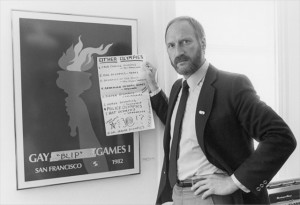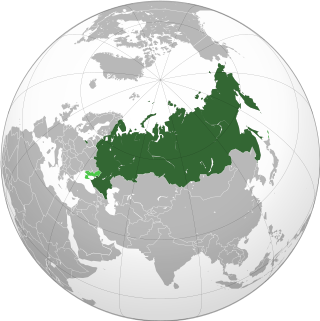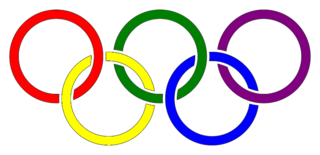
Tom Waddell was an American physician, decathlete who competed at the 1968 Summer Olympics, and founder of the Gay Olympics.

The 2014 Winter Olympics, officially called the XXII Olympic Winter Games and commonly known as Sochi 2014, were an international winter multi-sport event that was held from 7 to 23 February 2014 in Sochi, Russia. Opening rounds in certain events were held on 6 February 2014, the day before the opening ceremony.

Opposition to legal rights for lesbian, gay, bisexual, and transgender (LGBTQ) people exists throughout the world. LGBT rights opponents may be opposed to the decriminalization of homosexuality; laws permitting civil unions or partnerships or supporting LGBT parenting and adoption, LGBT military members, access to assisted reproductive technology, and access to sex reassignment surgery and hormone replacement therapy for transgender individuals.

The 2014 Winter Paralympics, the 11th Paralympic Winter Games, and also more generally known as the Sochi 2014 Paralympic Winter Games, were an international multi-sport event for athletes with disabilities governed by the International Paralympic Committee (IPC), held in Sochi, Russia, from 7 to 16 March 2014. 45 National Paralympic Committees (NPCs) participated in the Games, which marked the first time Russia ever hosted the Paralympics. The Games featured 72 medal events in five sports, and saw the debut of snowboarding at the Winter Paralympics.

Emma Anna-Maria Green, also known as Emma Green Tregaro is a retired Swedish high jumper. She won a bronze medal in the event at the 2005 IAAF World Championships. She represented Sweden at the 2008 and 2012 Summer Olympics. She finished 2nd at the 2010 European Athletics Championships with a new personal best of 2.01 m.

Lesbian, gay, bisexual, and transgender (LGBT) people in Russia face severe challenges not experienced by non-LGBT residents. Although sexual activity between consenting adults of the same sex is legal, homosexuality is disapproved of by most of the population and pro-LGBT advocacy groups are deemed "extremist" and banned. It is illegal for individuals to "promote homosexuality" and same-sex couples and households headed by same-sex couples are ineligible for the legal protections available to opposite-sex couples. Russia provides no anti-discrimination protections for LGBT people and does not have a designation for hate crimes based on sexual orientation and gender identity. Transgender people are not allowed to change their legal gender and all gender-affirming care is banned. There are currently no laws prohibiting discrimination based on gender identity or expression, and recent laws could be used to discriminate against transgender residents.

Lesbian, gay, bisexual and transgender (LGBT) people in the Bahamas have limited legal protections. While same-sex sexual activity is legal in the Bahamas, there are no laws that address discrimination or harassment on the account of sexual orientation or gender identity, nor does it recognize same sex unions in any form, whether it be marriage or partnerships. Households headed by same-sex couples are also not eligible for any of the same rights given to opposite-sex married couples.

Lesbian, gay, bisexual and transgender (LGBT) people in Georgia face significant challenges not experienced by non-LGBT residents. However, Georgia is one of the few post-Soviet states that directly prohibits discrimination against all LGBT people in legislation, labor-related or otherwise. Since 2012, Georgian law has considered crimes committed on the grounds of one's sexual orientation or gender identity an aggravating factor in prosecution. The legislative ban on discrimination has been enacted as a part of the Government efforts to bring the country closer to the European Union and make the country's human rights record in line with the demands of Georgia's European and Euro-Atlantic integration.

Lesbian, gay, bisexual, and transgender (LGBT) people in Moldova face legal and social challenges and discrimination not experienced by non-LGBTQ residents. Households headed by same-sex couples are not eligible for the same rights and benefits as households headed by opposite-sex couples. Same-sex unions are not recognized in the country, so consequently same-sex couples have little to no legal protection. Nevertheless, Moldova bans discrimination based on sexual orientation in the workplace, and same-sex sexual activity has been legal since 1995.

The history of lesbian, gay, bisexual and transgender people (LGBT) in Russia and its historical antecedents has largely been influenced by the political leanings of its rulers. Medieval Catholic-Protestant Europe had the largest influence on Russian attitude towards homosexuality. Russian LGBT history was influenced by the ambivalent attitude of the Russian Orthodox religiosity regarding sexuality.

Pride House is a dedicated temporary location which plays host to lesbian, gay, bisexual and transgender (LGBT) athletes, volunteers and visitors attending the Olympics, Paralympics or other international sporting event in the host city. The first was organized for the Vancouver 2010 Winter Olympics.
There were many controversies and concerns affecting the 2014 Winter Olympics. There were disputes with Circassians, who demanded the events be cancelled or moved unless Russia apologized for the 19th century Circassian genocide, environmental and economic issues, lack of political stability and governance, and the safety and human rights of LGBT athletes and journalists, in light of Russia's "gay propaganda" laws, which sparked Olympic-focused protests. However, all of these events were overshadowed by the massive Russian state-sponsored doping program uncovered in the aftermath of the Games.
Gay Mountain is a 90-second video created for UK broadcaster Channel 4 by its in-house advertising agency 4Creative. It first aired across all of Channel 4's television channels on the day of the official opening of the Sochi 2014 Winter Olympics, 7 February 2014, having been released on YouTube the previous night, on 6 February 2014. Within 48 hours of its online release it had accumulated over half a million views.

Athletes and artists who identify as lesbian, gay, bisexual, transgender, pansexual, non-binary, queer, and/or intersex, and/or who have openly been in a same-sex relationship (LGBTQI+) have competed in the Olympic and Paralympic Games, either openly, or having come out some time afterward.
Belle Brockhoff is an Australian snowboarder, who has represented Australia at the FIS Snowboarding World Championships and the Winter Olympics. She competes in snowboard cross. She competed at the 2022 Winter Olympics, in Women's snowboard cross.

For the Purpose of Protecting Children from Information Advocating a Denial of Traditional Family Values, commonly known as the Russian anti-LGBT law or as the Russian anti-gay law, is a law of Russia. It was unanimously passed by the State Duma on 11 June 2013, unanimously passed by the Federation Council on 27 June 2013, and signed into law by President Vladimir Putin on 30 June 2013.

The Principle Six campaign, also Principle 6, or P6, was launched in January 2014 as an Olympic protests of Russian anti-gay laws in conjunction with the 2014 Winter Olympics being held in Sochi, Russia. Principle 6 refers to the sixth principle of the Olympic Charter that says any form of discrimination "is incompatible with belonging to the Olympic Movement."
Any form of discrimination with regard to a country or a person on grounds of race, religion, politics, gender or otherwise is incompatible with belonging to the Olympic Movement.
All Out is a global not-for-profit organisation that is focused on political advocacy for the human rights of lesbian, gay, bisexual, transgender, queer/questioning, intersex, asexual/aromantic and all others in LGBTQIA+ communities. It was first established in 2010 as a program of Purpose Foundation, later becoming its own legal entity, Purpose Action, and finally All Out Action Fund, Inc. in 2014.
Hunted: The War Against Gays in Russia is a 2014 HBO documentary film by Ben Steele on anti-gay violence in Russia. It is narrated by Matt Bomer.














